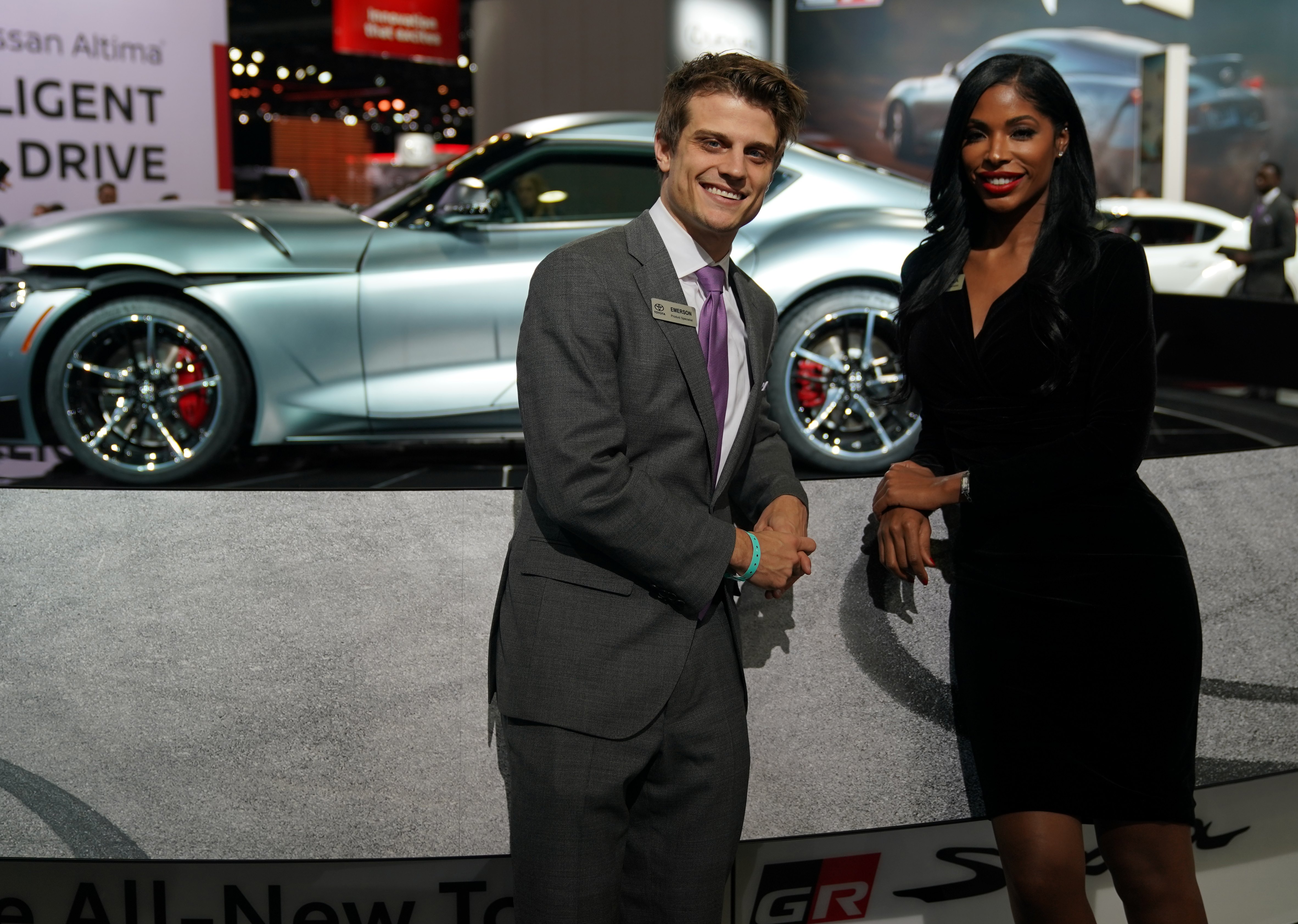Detroit auto show models — the human ones — embrace new role
Emerson Niemchick (L) and Priscilla Tejeda are “product specialists” for Toyota at the Detroit auto show (TIMOTHY A. CLARY)
Detroit (AFP) – Every year at the Detroit auto show, good-looking women — and men — are deployed by the carmakers to present their new vehicles.
But with the shockwave created by the #MeToo movement still reverberating across the country, there are fewer auto show models of the human variety — and they are not just pretty faces.
The “product specialists” still have picture-perfect smiles, but they also can tick off the features of each car and prices with such assurance that the iPads they carry for reference can seem merely decorative.
Auto companies are also making sure their fleet of specialists are ethnically and physically diverse.
Perched on stilettos, Priscilla Tejeda is working for Toyota. The tall black woman, whose father was a mechanic, is introducing the latest Supra, the Japanese brand’s legendary sports car and one of the show’s highlights.
She has worked most of Toyota’s event for the past decade as a product specialist.
“We talk to the consumers every day and try to answer their questions about the vehicles and maybe narrow down their choices on what they’re looking for,” Tejeda said.
Some come in and don’t know if they want an SUV or a sedan or a truck. We ask them questions about their lifestyle and see what fits best for them,” she said.
Of course, Tejeda has heard dumb sexist remarks in the past — “Do you come with the car?” is a classic, she says.
But otherwise, she says she has not experienced harassment, and has noticed more respectful behavior towards her since the #MeToo movement began.
“Now, it’s more directly about the car,” she says.
– ‘Product specialist’ –
The new title of product specialist for both women and men working the auto show floor is a tiny step forward in an industry that is still male-dominated.
“We know about cars. We’re not just a set of pearls, we’re not just models,” said Emerson Niemchick, a Toyota product specialist whose wife works for its luxury Lexus brand.
“There’s obviously a lot of very attractive people doing the auto show but they are trained — they’re very knowledgeable about the vehicles,” he said.
“We get to sell them without selling the actual vehicles. It’s fun.”
Niemchick and Tejeda both work for Productions Plus, one of the five biggest talent agencies that supply product specialists for the big US auto shows.
At the Detroit show, the agency has provided 300 men and women to staff the various stands. In April, it will have 500 at the New York show.
Productions Plus recruits product specialists through what it says are “very selective” auditions. The candidates send in an introductory video in which they extol the merits of a car of their choice.
They are then called in for interviews with the agency and later with the brands.
If they are hired, they go through a week-long training session in which they are plied with a ton of information about the automaker, the models and the corporate culture.
The crash course ends with practical tests, including car trips under real traffic conditions.
Afterwards, the specialists spend a day each month in online training and visiting a dealership.
The pay ranges from $200 to $1,000 a day, depending on their level of responsibility.
“We’re looking for someone that can deliver a scripted presentation, that can come off the platform and engage on the floor as well,” said Hedy Popson, president of Production Plus.
Popson, a former auto show hostess herself, acknowledged that clients often ask for models but her team talks to them “about the brand and a new paradigm.”
“That tends to be more of an actor or someone with a marketing background or a sales background. So it’s certainly not excluded (to have traditional) models, but it’s not a modeling job,” she said.
“The dynamic has changed.”
Disclaimer: This story is published from a syndicated feed. Siliconeer does not assume any liability for the above story. Validity of the above story is for 7 Days from original date of publishing. Content copyright AFP.


